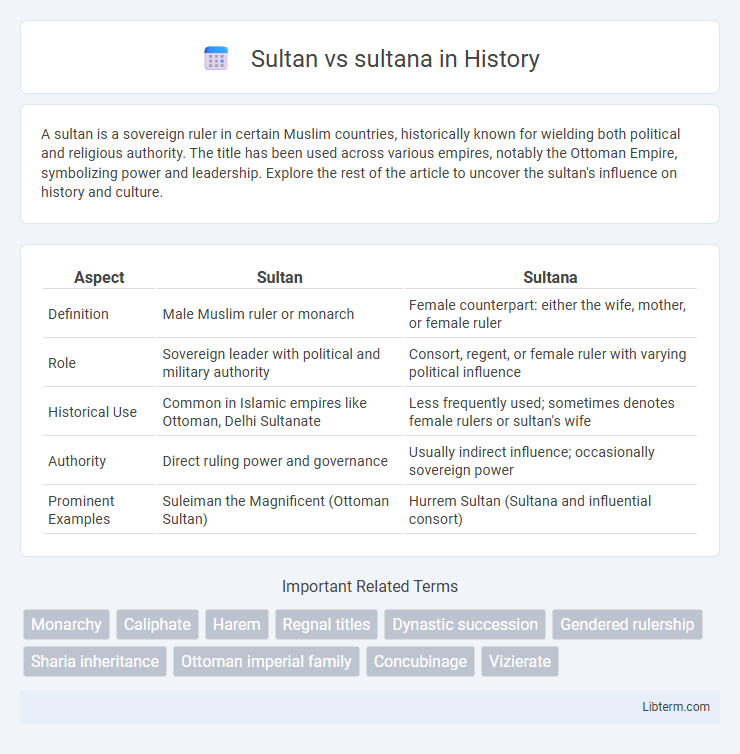A sultan is a sovereign ruler in certain Muslim countries, historically known for wielding both political and religious authority. The title has been used across various empires, notably the Ottoman Empire, symbolizing power and leadership. Explore the rest of the article to uncover the sultan's influence on history and culture.
Table of Comparison
| Aspect | Sultan | Sultana |
|---|---|---|
| Definition | Male Muslim ruler or monarch | Female counterpart: either the wife, mother, or female ruler |
| Role | Sovereign leader with political and military authority | Consort, regent, or female ruler with varying political influence |
| Historical Use | Common in Islamic empires like Ottoman, Delhi Sultanate | Less frequently used; sometimes denotes female rulers or sultan's wife |
| Authority | Direct ruling power and governance | Usually indirect influence; occasionally sovereign power |
| Prominent Examples | Suleiman the Magnificent (Ottoman Sultan) | Hurrem Sultan (Sultana and influential consort) |
Introduction to Sultan and Sultana
The term "Sultan" refers to a sovereign ruler or monarch, historically associated with Muslim states, wielding political and military authority. "Sultana" denotes the female equivalent, referring either to the wife or female ruler in a sultanate, often holding significant influence or governance roles. Both titles originate from Arabic, symbolizing leadership and power within Islamic cultures and empires.
Historical Origins of Sultan and Sultana
The title "Sultan" originated in the Islamic world during the medieval period, signifying authority and rulership predominantly held by male sovereigns in regions such as the Ottoman Empire, Delhi Sultanate, and various Middle Eastern and North African states. "Sultana," derived from the feminine form of Sultan, historically referred to the consort or female sovereign, although its use and recognition varied across Islamic cultures and dynasties. The distinct roles and titles of Sultan and Sultana reflect the complex gendered hierarchies and political structures within Islamic monarchies from the 7th century onward.
Etymology and Semantic Differences
The term "Sultan" originates from the Arabic word "slTn" (sultan), meaning authority or power, traditionally referring to a Muslim sovereign ruler. "Sultana," the feminine form derived from the same root, semantically denotes a female ruler or the wife of a sultan, emphasizing gender distinction in sovereignty or status. While both share etymological roots, "Sultan" primarily conveys male rulership and political authority, whereas "Sultana" signifies female rulership or consort roles within Islamic monarchies.
Sultan: Role and Authority
Sultan denotes a sovereign ruler, predominantly in Islamic states, wielding supreme political and military authority. This title signifies control over governance, lawmaking, and defense, often hereditary and symbolizing ultimate power within a sultanate. Unlike sultana, which may refer to a female ruler or the wife of a sultan, the term sultan embodies central leadership and command in historical and contemporary contexts.
Sultana: Title, Status, and Influence
Sultana is the feminine counterpart to Sultan, often designating a woman of royal status in Islamic monarchies, either as the wife or mother of a Sultan, or as a reigning queen. The title Sultana conveys significant influence in court politics, social affairs, and cultural patronage, highlighting the powerful roles women held behind the throne. Historical examples such as Sultana Nur Jahan illustrate how the title entailed substantial political authority and governance beyond ceremonial status.
Cultural Contexts and Variations
The titles "Sultan" and "Sultana" reflect distinct cultural contexts and gender roles within Islamic and Middle Eastern societies, where "Sultan" denotes a male sovereign with political and military authority, and "Sultana" often refers to a female consort or ruler, varying in power and recognition across regions. In Ottoman and Mughal empires, "Sultana" could signify the sultan's wife or mother, whose influence fluctuated from ceremonial to substantial political power. Variations in usage highlight how gender and cultural norms shape the roles and status attributed to these titles in historical and contemporary Islamic governance.
Sultan vs Sultana in Different Empires
The title "Sultan" historically denoted a male ruler or sovereign in Islamic empires such as the Ottoman, Seljuk, and Mamluk dynasties, symbolizing supreme authority and political power. In contrast, "Sultana" referred to a female of royal status, often the wife, mother, or daughter of a Sultan, holding influence within the harem or court but rarely exercising direct political control. Across different empires, the Sultan wielded administrative and military command, while the Sultana's power was more social and familial, reflecting distinct roles and statuses within Islamic governance structures.
Modern Usage and Perceptions
The term "Sultan" traditionally refers to a Muslim sovereign or ruler, predominantly used in historical and contemporary contexts across Middle Eastern and South Asian regions. In modern usage, "Sultana" often denotes the wife or female counterpart of a Sultan, but it also refers to a female ruler in some cultures, with its perception evolving to symbolize female authority and empowerment in Islamic societies. Contemporary discussions emphasize the distinct gender roles implied by these titles while acknowledging their cultural and linguistic variations in different countries.
Common Misconceptions about Sultan and Sultana
The term "Sultan" traditionally refers to a male ruler in Muslim-majority regions, while "Sultana" can denote either a female ruler or the wife of a Sultan, causing frequent confusion. Common misconceptions arise from assuming that "Sultana" solely represents a consort, overlooking instances where women held sovereign power under the title. Clarifying the distinct historical and cultural roles associated with both titles helps address inaccuracies in their usage.
Conclusion: Legacy and Contemporary Relevance
The legacy of the Sultan as a historical ruler endures in modern political and cultural narratives across the Islamic world, symbolizing authority and governance. The role of the Sultana, often overshadowed, is gaining recognition for its influence in social and dynastic realms, highlighting evolving gender dynamics in leadership. Contemporary relevance of both titles reflects shifting perspectives on power, heritage, and the intricate balance between tradition and modernity in Muslim societies.
Sultan Infographic

 libterm.com
libterm.com